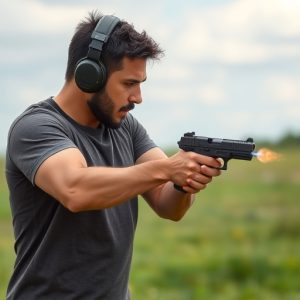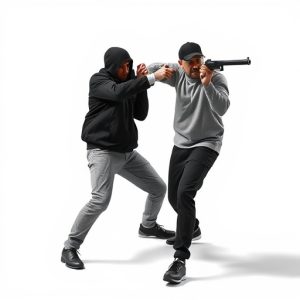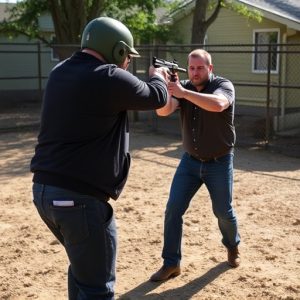Mastering Non-Lethal Self-Defense: Stun Gun Certification Guide
Non-lethal self-defense stun weapons, including stun guns, Tasers, and pepper spray, are growing in…….
Non-lethal self-defense stun weapons, including stun guns, Tasers, and pepper spray, are growing in popularity for personal safety. Certification programs for these Electronic Control Devices (ECDs) are essential to ensure safe and effective use, covering legal implications, handling techniques, and de-escalation strategies. Comprehensive training includes weapon mechanics, situational assessment, hands-on practice, first aid, and emergency response. Obtaining a Non-Lethal Weapon Certification equips individuals with the knowledge to deploy stun weapons responsibly within legal parameters, providing peace of mind and practical self-defense skills.
“Explore the transformative power of non-lethal self-defense weapons, a growing option for personal safety. This comprehensive guide delves into the world of stun guns and their certification process, offering a unique approach to security. From understanding the fundamentals to navigating rigorous training programs, you’ll uncover the benefits and crucial aspects of acquiring a Non-Lethal Self-Defense Stun Weapons certification. Whether for self-protection or professional use, this article ensures you’re well-prepared.”
- Understanding Non-Lethal Self-Defense Weapons
- The Importance of Certification for Stun Guns
- What to Expect in Training Programs
- Benefits and Considerations for Non-Lethal Weapon Certification
Understanding Non-Lethal Self-Defense Weapons

Non-lethal self-defense stun weapons have gained significant attention in recent years as a preferred option for individuals seeking to protect themselves without causing permanent harm. These tools are designed to incapacitate an assailant temporarily, giving users time to escape or seek help. Understanding the dynamics of these weapons is crucial for anyone considering obtaining a non-lethal self-defense stun weapon certification.
Stun guns, Tasers, and pepper spray are common examples of non-lethal weaponry. Each operates differently; stun guns use electric current to disrupt muscular control, Tasers fire probes that deliver an electrical shock, while pepper spray irritates the eyes and respiratory system. Training in these weapons involves learning their safe handling, deployment techniques, and legal implications—essential knowledge for responsible self-defense.
The Importance of Certification for Stun Guns
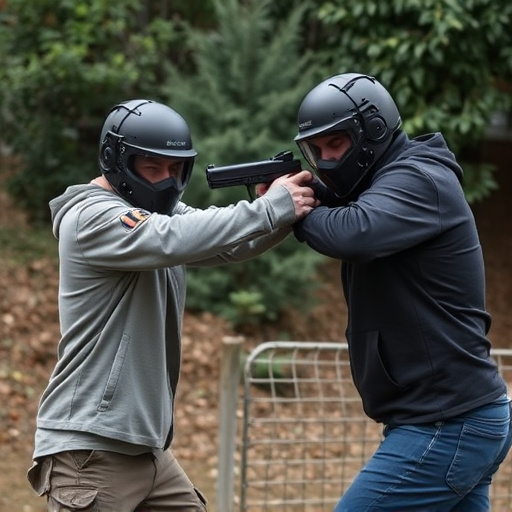
In today’s world, personal safety is a top priority for many individuals, and non-lethal self-defense tools like stun guns have gained significant popularity. Stun guns, also known as electronic control devices (ECDs), are powerful yet non-deadly weapons designed to temporarily incapacitate an assailant, giving the user time to escape or seek help. Given their growing prevalence, obtaining a certification for stun gun usage is becoming increasingly important.
Certification programs ensure that users understand how to operate these devices safely and effectively. They cover crucial aspects such as legal implications, proper handling techniques, and de-escalation strategies. This training empowers individuals to make informed decisions in high-stress situations while adhering to local laws and regulations governing non-lethal self-defense stun weapons.
What to Expect in Training Programs

In non-lethal self-defense stun weapon training programs, participants can expect a comprehensive and structured curriculum designed to equip them with the knowledge and skills necessary to use these tools effectively and responsibly. The training typically begins with an introduction to non-lethal force concepts, covering legal aspects, ethical considerations, and the principles of de-escalation. This is followed by hands-on practice with various stun weapons, teaching proper handling, deployment techniques, and safety precautions.
Students will learn about different types of stun devices, their operational mechanisms, and how to assess a situation to determine when and where to use them appropriately. Training programs also emphasize the importance of physical fitness and situational awareness, incorporating drills that simulate real-life scenarios. Additionally, candidates receive instruction on first aid and emergency response procedures, ensuring they can provide immediate assistance if needed.
Benefits and Considerations for Non-Lethal Weapon Certification
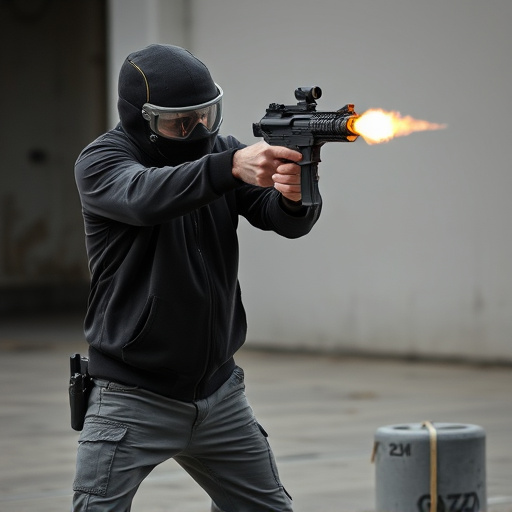
Obtaining a Non-Lethal Weapon Certification offers a multitude of benefits for individuals interested in self-defense. These certifications equip individuals with the knowledge and skills to use non-lethal self-defense stun weapons effectively, providing peace of mind and a powerful deterrent against potential threats. With proper training, certified users can defend themselves or others while minimizing the risk of permanent injury, which is crucial for de-escalation scenarios and legal considerations.
When considering Non-Lethal Weapon Certification, it’s essential to weigh the advantages against personal circumstances and needs. Factors such as the specific non-lethal weapon type, regional regulations, and individual comfort levels with physical confrontations should be taken into account. Responsible certification programs offer comprehensive training that includes not only weapon handling but also de-escalation techniques, legal guidelines, and safety protocols, ensuring certified individuals are well-prepared to handle situations involving non-lethal self-defense stun weapons effectively and within the bounds of the law.
Obtaining a non-lethal weapon training certification is a responsible step towards empowering yourself with effective self-defense tools. By understanding the capabilities and limitations of non-lethal self-defense stun weapons, you can make informed decisions in potentially dangerous situations. Certification programs equip individuals with the knowledge and skills to use these devices safely and effectively, ensuring that you are prepared without resorting to lethal force. Embrace this opportunity to enhance your personal safety and contribute to a safer community.
